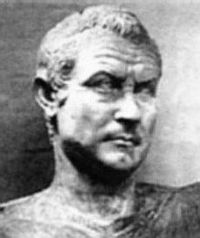- Menaechmi
-
Menaechmi 
PlautusWritten by Plautus Characters Peniculus (Menaechmus's friend)
Menaechmus of Epidamnus
Erotium (Menaechmus's mistress)
Cylindrus (Erotium's cook)
Sosicles/Menaechmus of Syracuse)
Messenio (slave)
Erotium's servant
Menaechmus's wife
Father-in-law of Menaechmus
a doctor
Decio (wife's servant)Setting a street in Epidamnus, before the houses of Menaechmus and Erotium Menaechmi, a Latin-language play, is often considered Plautus' greatest play. The title is sometimes translated as The Brothers Menaechmus or The Two Menaechmuses.
The Menaechmi is a comedy about mistaken identity, involving a set of twins, Menaechmus of Epidamnus and Menaechmus of Syracuse. It incorporates various Roman stock characters including the parasite, the comic courtesan, the comic servant, the domineering wife, the doddering father-in-law and the quack doctor. As with most of Plautus's plays, much of the dialogue was sung. [1]
Contents
Plot
Moschus has twin sons, Menaechmus and Sosicles. Moschus decides to take only one of the twins, Menaechmus, with him on a business trip, while the twins are still young. During the trip, Menaechmus is abducted and adopted by a businessman who lives in Epidamnus, separating the twins. Their father dies of sorrow.
Sosicles, who has been renamed Menaechmus by his grandfather in memory of his long-lost brother, spends many years traveling in search for Menaechmus. Eventually, Sosicles is ready to give up hope and return home; however, prior to returning, he decides to make one last stop at Epidamnus. Because of their identical looks and names, the two Menaechmi are often mistaken for each other, causing Sosicles to view the people of Epidamnus as rude and peculiar and getting Menaechmus into trouble with his wife and friends.
At the end of the play, Menaechmus and Sosicles finally meet and realize that they are twins, with much help from Sosicles's slave Messenio. Messenio is then granted freedom for his aid.
Adaptations and influences
This play was the major source for William Shakespeare's The Comedy of Errors[2], which was subsequently adapted for the musical theatre by Rodgers and Hart in The Boys from Syracuse. A similar line of influence was Carlo Goldoni's 1747 play I due gemelli veneziani ("The two Venetian twins") (also adapted as The Venetian Twins in 1979). Shakespeare's Twelfth Night also features mistaken twins, the sister dressed as a boy.
Translations
- William Warner, 1595 [2] and [3]
- Henry Thomas Riley, 1912: Menaechmi (full text)
- Paul Nixon, 1916-38
- Edward C. Weist and Richard W. Hyde, 1942
- Palmer Bovie, 1962
- E. F. Watling, 1965
- Erich Segal, 1996
- Deena Berg and Douglass Parker, 1999
- David M. Christenson, 2010 [4]
Latin text
References
- ^ Paul L. MacKendrick, Herbert M. Howe, Classics in Translation, Volume II,1959, "[1]" May 11, 2011
- ^ Olive Classe, editor, Encyclopedia of Literary Translation, 2000, p. 1266
Surviving plays by Plautus 
- Amphitryon
- Asinaria
- Aulularia
- Bacchides
- Captivi
- Casina
- Cistellaria
- Curculio
- Epidicus
- Menaechmi
- Mercator
- Miles Gloriosus
- Mostellaria
- Persa
- Poenulus
- Pseudolus
- Rudens
- Stichus
- Trinummus
- Truculentus
Categories:- Plays by Plautus
Wikimedia Foundation. 2010.
